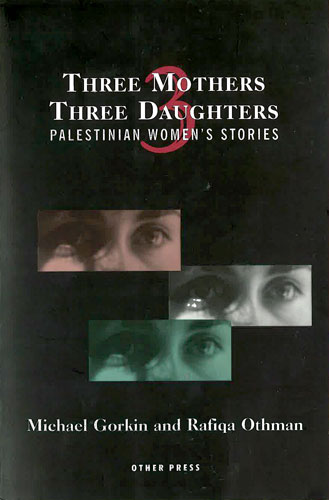Anera Reads
Posted in: Society & culture
What we’re reading
These books are Anera staff and supporter favorites. They give some context to life, history and culture in the countries where we work: Palestine, Lebanon and Jordan. We also feature some writings that describe the experiences of refugees and other communities related to those we serve in the Middle East that may be marginalized in different contexts. We hope you’ll be inspired to read a few of these excellent books!
September 2023
Born a Crime
by Trevor Noah
Trevor Noah’s memoir, “Born a Crime,” stands out for several reasons. First, it highlights the stark similarities between apartheid in Africa and the system in Palestine. Second, it portrays Trevor’s challenging childhood, making his success all the more inspiring. Finally, the book is a testament to the utmost love and respect Trevor has for his mom.
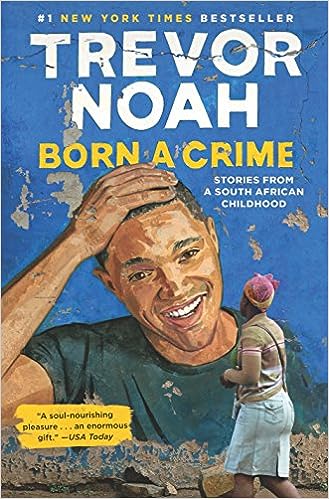

The similarities between apartheid in Palestine and South Africa are striking. Both systems relied on segregation and discrimination against specific racial or ethnic groups. Palestinians faced limitations on their basic rights compared to Israeli citizens, even those holding Israeli citizenship experienced discrimination. Land was taken from natives in South Africa and Palestinians in Palestine. Black communities were forced to move to ghettos and experienced land annexation, replaced farmland with settlements, and faced strict zoning laws. Both regions had different legal systems, with Palestinians largely under military law, requiring IDs and permits for movement, limited control of resources, airspace, and water channels, while both systems relied on the use of force and violence to maintain control.
Trevor’s childhood was extremely difficult. His mother was a Xhosa black woman, and his father was a Swiss-German. He could not be seen in public with either of his parents, as they could be jailed for having a colored child. Trevor grew up poor with limited opportunities, often going to bed hungry. He faced an abusive step-dad and numerous challenges, even spending a week in jail. Despite all this, he maintained humor and remained steadfast in his pursuit to escape a life of poverty.
What I loved the most throughout the book was Trevor’s love for his mom, which takes center stage. He is in awe of her strength, unwavering love, devotion to her faith, and constant care and support. Despite being a victim of GBV, she remained dedicated to her family, and Trevor admired her rebellious acts in fighting against the apartheid system. More than anything, this is a tribute of love for his mom.
I strongly recommend this book. I was rooting for Trevor in every chapter and finished admiring and respecting him even more.
– Sandra Rasheed, reviewer
Greater Than the Sum of Our Parts
by Nada Elai
In Nada Elai’s important work, she explores the complex interactions of settler colonialism, indigenous resistance, and the process of decolonization. She also broadens her focus to address global issues, including the Palestine conflict and climate change. This book urgently calls for action and encourages readers to rethink the critical challenges of our time.
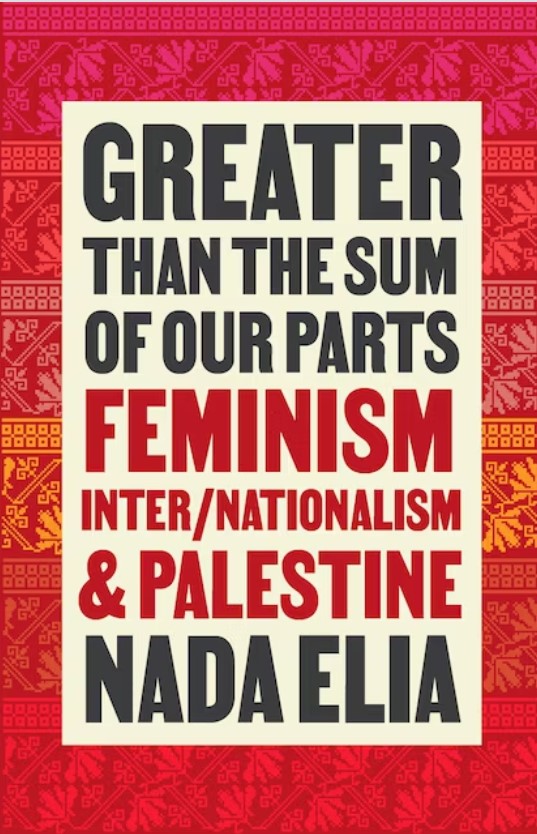

Elai highlights the harmful “destroy and replace” approach of settler colonialism, which goes beyond taking land and even impacts fundamental human rights like food security. She argues that these tactics not only oppress but also distract and occupy people’s minds, which is both troubling and enlightening.
While the book covers various topics, Chapter four offers a unique perspective on the relationship between food, politics, and identity. Specifically, it emphasizes the importance of connecting food sovereignty to national identity. Elai contends that food independence is a crucial part of national independence, making a compelling case for indigenous people to embrace culinary independence as a form of decolonization.
In places like Gaza and the West Bank, indigenous women play a vital role in preserving their culture and challenging the settler colonial agenda through activities such as farming and nurturing olive trees. Elai also highlights examples of Palestinian chefs in diaspora who feed their host communities, showcasing these small acts of resistance that contribute to the broader struggle for dignity and autonomy.
Elai’s work is rooted in values such as sustainability, community, agency, and social justice. It makes a significant contribution to the discourse on settler colonialism and decolonization, echoing the words of Palestinian poet Mahmoud Darwish: “We have, on this land, that which makes life worth living.”
– Rania Elhilou, reviewer
The Wedding of Zein
by Tayeb Salih
Thanks to my colleague, Leen Ataya, I recently read a beautiful novella by Sudanese author Tayeb Salih. I got instantly immersed in the rich cultural tapestry of rural life in Sudan.
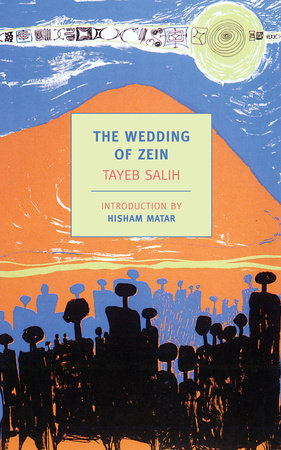

The Wedding of Zein transports readers to the cultural diversity of a Sudanese community. As he examines the complexity of human nature, tradition, and spirituality, Salih’s storytelling talent shines. Zein, an eccentric villager whose imminent wedding turns into a community event, centers the narrative on a cast of colorful people. The seamless fusion of mythology and spirituality in this tale, together with the peculiar character of Zein, adds a sense of fascination and enjoyment.
Interlaced with themes of love, community, and the conflict between tradition and modernity, Salih beautifully captures Sudanese rural life and social environment.
Lacking prestige and wealth, Zein holds no significant standing in his society, often finding himself closer to a social misfit amidst an evolving community. To me, Zein represents the life journey of thousands of young Lebanese, Syrians and Palestinians who flourish in Lebanon despite the exclusionary system. In the story, Zein possesses a mysterious ability to bring people together and ultimately brings about a plot twist that echoes my personal belief that the challenges faced by Lebanon’s youth foreshadows an inevitable transformation.
The Wedding of Zein is a charming and condensed exploration of human nature and tradition that will leave a strong and lasting effect on the reader’s heart and mind. It is a timeless (and strongly recommended) book.
– Dima Zayat, reviewer
May 2023
Our Women on the Ground: Essays by Arab Women Reporting from the Arab World
Edited by Zahra Hankir
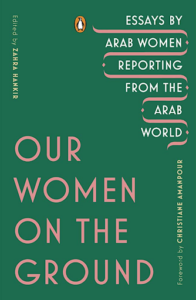

Our Women on the Ground is a collection of essays written by Arab women reporting from countries throughout the Arab world. Women journalists, sahafiyat, recount and reflect on their experiences reporting on the diverse region. The topics of the 19 essays range from a first-hand account of the 2014 Gaza War to a personal reflection on intersectional identity to the realities of living amidst protracted conflicts. The collection is separated into five sections that group the essays by common themes: Remembrances, Crossfire, Resilience, Exile, and Transition.
Although each essay is distinct and written by a different journalist, the collection as a whole underscores the danger of depicting the Middle East and the Arab world as a monolithic society. Historically, Western news media has reinforced negative stereotypes and utilized harmful rhetoric to shape public perception about conflicts like the Iraq War. Many of the journalists included in this collection have worked for Western news organizations at some point in their careers, which has informed their understanding and analysis of the role media plays in social and political landscapes. Journalists Hannah Allam and Asmaa al-Ghoul describe the process of becoming desensitized to the pains of conflict through overexposure to violence, suffering, and fear. Images of war are a common occurrence in reporting on the Middle East, especially when the report pertains to protracted conflicts like those in Palestine and Syria. News consumers throughout the world often come to understand these civilian casualties as unavoidable byproducts of war. These sahafiyat work against the dominate Western narrative that conflict is endemic to the Middle East by providing historical context to political and social events while amplifying the lived experiences of the people in these regions.
Contributors Lina Attalah and Jane Arraf dispel the myth that individuals living in these regions are passive victims of conflict with no agency or understanding of political and social dynamics. Attalah is specifically critical of journalists who understand and aim to explain the social and political dynamics of Middle Eastern countries through a Western lens. To her, local resistance, empowerment, and feminist movements are not reliant on Western support or inspiration. Attalah’s insight, along with that of 18 other women journalists, provides an alternative and informed explanation of the issues facing their home countries. This collection serves as an important reminder that an intersectional approach is necessary to develop a comprehensive understanding of this dynamic region. First-hand accounts of local people and journalists with direct connections to the regions they cover serve as the best source of knowledge for humanitarian assistance and peacemaking efforts. Without the guidance of these essential perspectives, foreign intervention and humanitarian efforts in the Middle East will stifle long-term development.
– Zac Contreras, reviewer
Three Mothers, Three Daughters: Palestinian Women’s Stories
by Michael Gorkin
This is a collection of stories told by three mothers and their daughters, who were interviewed during the 1990s by Michael Gorkin and Rafiqa Othman. The authors chose mother-daughter pairs that, although all living within close proximity to one another, had different life experiences, views, and opinions. It’s mostly written in first person and the style is conversational and informal.
Um Mahmud and her daughter Marianne from East Jerusalem were not interested or involved in the politics that shaped their daily lives. In contrast, Um Abdullah and Samira from Camp Aida (a refugee camp) had paid a heavy price for their political involvement. Finally, there was Um Khaled and Leila from Abu Ghosh, the only Arab village to survive after the 1948 war, and the only pair to be living within Israel’s walls. The stories that these women shared were clearly influenced by the Israeli-Palestinian conflict, but it made the conflict personal.
Despite the differences between generations, and the fact that they all had very different lives, all six women had to deal with the idea that they were inferior because they were women. Their struggle to be seen, heard, and respected is one that is all too familiar – any woman reading this book will be able to relate to them in this way. In some ways I could fully understand their frustrations.
With every turn of the page, I got an inside glimpse into who these women were – their hopes, dreams, heartaches, fears, and realities. This was an emotional journey. I laughed, I cried, but more than anything, I learned. I consider this book a must-read for anyone interested in learning about the personal experiences of women in the Israeli-Palestinian conflict.
– Jackelyne Briseno, reviewer
House of Stone
by Anthony Shadid
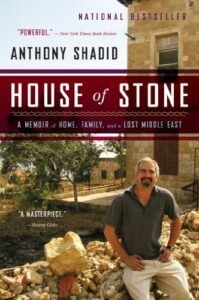

House of Stone recounts the months in 2007 that Shadid spent supervising the renovation of his nearly century-old family home in the village of Marjayoun, Lebanon. Shadid committed himself to restoring the glory of the house and honoring its history through selective restoration of its original elements, like the Ottoman-era patterned cemento tiles once much in fashion.
Interspersed with his accounting of the colorful characters that populate the village in 2007, Shadid relates the story of the Lebanon of his great grandparents’ generation who witnessed the collapse of Ottoman rule and built the family house, and his grandparents who emigrated to Oklahoma.
Through his family story he engagingly depicts the past and present of Lebanon and all of the strife it has experienced.
“This is a nation in recovery from losses that cannot be remembered or articulated, but which are everywhere,” he writes. “Afterlife is bent, torn, exploded, there are shattered pieces that do not heal for years, if at all.”
Lebanon, particularly seen from a small village with a dwindling population, appears to Shadid essentially tragic. “We have lost the splendors our ancestors created and we go elsewhere. People are reminded of that every day here, where an older world, still visible on every corner, fails to hide its superior ways.”
Still Shadid captures some of what has always made Lebanon loom large in the collective imagination.
“For years [Lebanon] was a sanctuary to Arab dissidents: Palestinian exiles and Lebanese of all sects and tendencies, who in turn delivered a cadence to Arab politics in an environment that, while ridden with strife, oppression and poverty, was relatively free and unencumbered.
He is unromantic about the country’s situation, however.
“These days grander struggles had given way to narrow ones, and Lebanon had become much smaller than it ever was. … Lost these days was any notion of collective action. Bonding around principles or ideals seemed a kind of romantic memory. The stuff of archived posters with their dated haircuts.”
Shadid died tragically young in 2012, only a few days before the publication of his book. Knowledgeable and grounded in his judgments, he was one of the most widely respected war correspondents reporting on the Middle East. The audiobook is ably narrated by Neil Shah.
– Steve Fake, reviewer
October 2022
Men in the Sun and Other Palestinian Stories
by Ghassan Kanafani
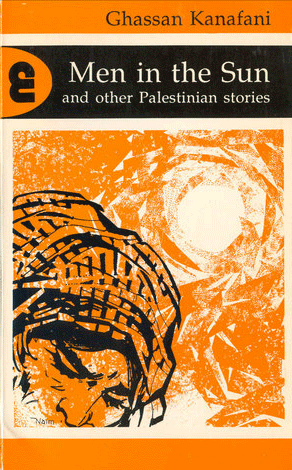

“Men in the Sun and Other Palestinian Stories” is a carefully written novel that carries the reader through a number of tales about times of war and hardship for Palestinians. Originally published in 1962 as “Men in the Sun,” and later republished with additional stories in 1983 after his assassination, Ghassan Kanafani brings to life the heart and soul of Palestinian struggle through a magnificent display of imagery, like the ever-present fiery heat of the desert.
Themes of mystery, like in the short story “‘If You Were a Horse…,’” where the reader remains in the dark as to whether the father of the story lives or dies, are exemplary of the uncertainty ever-present in the lives of many Palestinians. Meanwhile, Kanafani’s portrayal of Umm Saad’s motherly instincts as a prisoner lends a sense of hope and humanity to the collection. These sometimes disheartening and confusing stories have defined the times following 1948, known to Palestinians as the Nakba, and the war of 1967. As Palestinian displacement is ongoing, Kanafani’s stories help contextualize the events of today into the histories of Palestinians and their ancestors.
The titular story, “Men in the Sun,” is an compelling narrative of hardship, partnership, bravery, and loss, showing how all intertwine for people subject to the cycle of displacement which has befallen innocent Palestinians. In the story, set sometime in the aftermath of 1948, main characters Abu Qais, Marwan, and Assad desperately wish to find a smuggler willing to take them to Kuwait. The path to Kuwait from their refugee camps in Jordan is dangerous, filled with military checkpoints and – worst of all – crosses the blazing hot Iraqi desert. The abrupt ending to this story might find some readers startled, but it highlights the passivity and lack of emotion that the characters in the story embody since being forced to live with so much uncertainty for their and their families’ survival.
Kanafani’s collection of short stories are a must-read for those wishing to familiarize themselves with an iconic work of Palestinian literature and with the struggles that continue to impact Palestinians and their families today. Not only is the author’s abstract narrative captivating, his story-driven, limited-perspective style of writing helps the reader try to understand the soul of Palestinian identity.
– Michael Feltovic, reviewer
The 100 Year War on Palestine: A History of Settler Colonialism and Resistance
by Rashid Khalidi
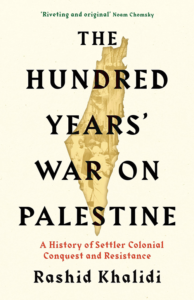

I love this book. It is approachable to those with little background knowledge of Palestine while also being a valuable resource to those who study Palestine in depth. Khalidi uses his multigenerational family experience of the conflict to situate the history and political ramifications of each of the Arab-Israel and Israel-Palestine conflicts. Beginning at the fall of the Ottoman Empire, each chapter addresses a different period of conflict.
– Holly Jordan, reviewer
Palestinian Refugees in International Law, 2nd edition
by Francesca Albanese and Lex Takkenberg
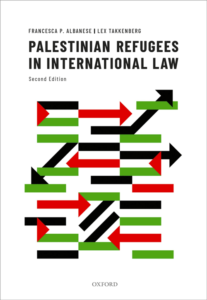

This book aims to be “the ultimate study on Palestinian refugees in international law.” And indeed, in the extensively reworked second edition Albanese and Takkenberg have produced an invaluable guide to the often confusing status of Palestinians within the international legal framework designed to protect refugees. Modern refugee law was still inchoate in 1948 when the Palestinians were first made to flee their homelands, under circumstances deeply intertwined with the actions of the United Nations itself. Moreover, the enduring plight of these refugees has become singularly politically charged on the international stage. For all of these reasons, the rights of Palestinian refugees, and even their status as legitimate refugees, is a subject of considerable debate and confusion among non-specialists. Though it is far from casual beach literature, readers will come away with far more insight into the history and present reality of the rights afforded to Palestinian refugees by international law. The authors wrote the book in the conviction that “international law should be the compass for protection and solutions for Palestinian refugees.” As such, it is a welcome resource for every supporter of Palestinian refugee rights seeking to get their bearings within the thicket of dense legal texts.
– Steve Fake, reviewer
June 2021
Mornings in Jenin
by Susan Abulhawa
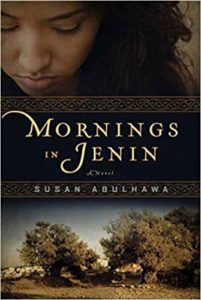

This is a beautifully written novel that takes the reader through a journey of a Palestinian family – the Abulhejas – from before the creation of Israel to the early 2000s. Susan Abulhawa paints an idyllic picture of small village life in Palestine before 1948, when many were forced out of their homes and villages. She then goes on to describe other major historical tragedies that befell Palestinians through the experiences of the family – expulsions from their villages and lands in Palestine, killing, imprisonment, and regular indignities they suffer through the decades. The book takes you from Palestine to Lebanon (during Israel’s invasion in 1978 and the Shatila massacre in 1982) to United States and back again to Palestine.
Despite the sad realities that the book describes, it’s not hard to read. The characters are nuanced and likable – full of complicated emotions, human flaws and virtues. Abulhawa does a nice job of balancing the tragic with the many moments of joy that life brings, even under the harsh conditions of a refugee camp.
I found this book to be very powerful and poignant. It’s a great primer for anyone who is new to the topic of modern Palestinian history or simply wants to read a well-written novel.
— Liz Demarest, reviewer
How Does It Feel to Be a Problem? Being Young and Arab in America
by Moustafa Bayoumi
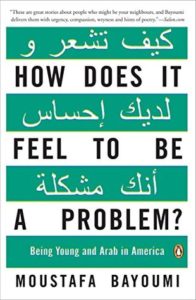

This book dives into the lives of seven Arab Americans in their 20s. Bayoumi, who was born in Zürich, Switzerland, to Egyptian parents, and now works as an English professor at Brooklyn College in New York, spent a significant amount of time getting to know each of the young adults featured in the book. Published over a decade ago, with Brooklyn as the backdrop of the book, we hear each of the young people reflect on what it meant to grow up Arab in America and how that changed in our post-9/11 world.
Their stories take the reader through the experiences of being young and Arab in America and how the events of 9/11 have impacted them mentally, emotionally, and physically. They share accounts of being wrongly jailed, facing discrimination in the workplace, fighting for justice, and their difficulties finding support and community as Arab-Americans, even as their homelands are also in turmoil.
This was not just written for Arabs and Arab-Americans. You do not need any previous knowledge about global issues or politics to understand what is happening in each of their stories. These accounts of their lives humanize Arabs and humble almost anyone with a heart. I encourage everyone to read this award-winning book and share it with others to bring more awareness of the discrimination facing Arabs and Arab-Americans.
— Saniah Naim, reviewer
I Saw Ramallah
by Mourid Barghouti
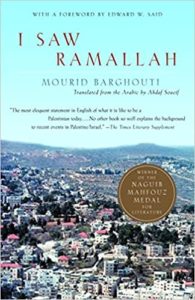

This memoir by renowned Palestinian poet Mourid Barghouti opens with his return to Palestine, after three decades of absence, via the Allenby Crossing. Of this terminal between Jordan and the West Bank, managed by Israel, he writes: “On the bridge, that strange border unmatched on any of the world’s five continents, you are overwhelmed by your memories of standing at the borders of others.” The poet brings, as Edward Said notes in an introduction, a “life-affirming poetic texture” that lends the book an “unmistakable stamp of profound authenticity.”
The events of the book take place in the mid-1990s during a period of change and optimism generated by the negotiations between the PLO and Israel. In this sense Barghouti’s journey was emblematic of the experience of many Palestinians who returned during this time period. The political negotiations of the time failed to live up to the hopes of the optimists, although Barghouti – a perceptive political observer – always remained skeptical. He chronicles the many changes to his homeland in the intervening years – the vast expansion of the settlements, the transformation of Ramallah – and reuniting with his friends and neighbors who remain, who update him on others who have died or emigrated.
Barghouti hails from Deir Ghassanah, a village outside of Ramallah. He describes the shock of having to buy olive oil in exile as “truly painful” because it forced him to recognize how distant home really was. In the village, nobody “ever bought oil or olives… for their own tables its people bring olives in from the fields and the oil in from the press to the storeroom and the barrels that are never empty from season to season.” Barghouti is a keen observer of people and takes appreciative note of the wisdom and eccentricities of the people he meets because, as he observes, “folk consciousness everywhere is brilliant at summarizing the human condition.”
Barghouti’s slender book is the memoir of a man who has always been in transit. “I have never been able to collect my own library. I have moved between houses and furnished apartments, and become used to the passing and the temporary. I have tamed myself to the feeling that the coffee pot is not mine.”
His return to Ramallah is a visit – not to stay – and so he must soon say his goodbyes with uncertain hopes of returning again in the future with his family.
— Steve Fake, reviewer
OUR BLOG
Related
There is no excerpt because this is a protected post.
Standing in the heart of Tyre, a city once full of life and history, I felt the weight of the devastation here, pressing down like the rubble that now defines its streets. As my team and I walked through the…
Learn how Anera is supporting displaced Palestinian families in Gaza as they navigate the challenges of winter.

